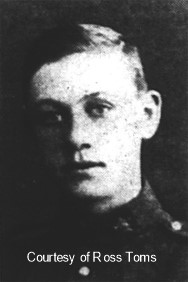|
Aug 19, 1895
|
Born in Manchester, England
|
|
Nov 10, 1914
|
Attested into the 21st Battalion in
Kingston, Ontario
Ø Number 59486 (temporary number 769)
Ø Next of kin given as Mrs. C Hughes, mother, 5
Redford St., Newton Heath, Manchester, England
Ø Previous occupation given as Telephone Lineman
Ø Previous military experience given as 59th
Regiment and the Royal Canadian Dragoons for 3 months
Ø Religion given as Church of England
Ø Posted to “G” Company
o
This was later
reorganized into “D” Company
o
He was later posted
to the Signals Section
The 21st Battalion trained in the
Kingston, Ontario area through the winter of 1914-15.
|
|
May 6, 1915
|
Embarked the RMS Metagama in
Montreal, Quebec
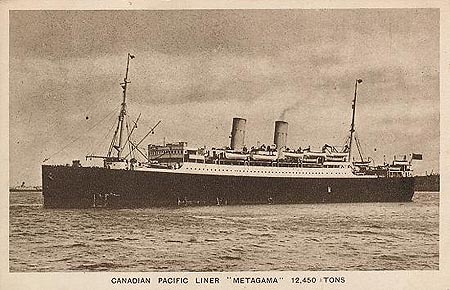
|
|
May 15, 1915
|
Disembarked in Devonport,
England and the battalion proceeded to the West Sandling Camp, near Hythe,
Kent to continue training
|
|
Aug 28, 1915
|
Posted to “C” Company
|
|
Sep 14, 1915
|
Embarked the St. Seiriol in
Folkestone
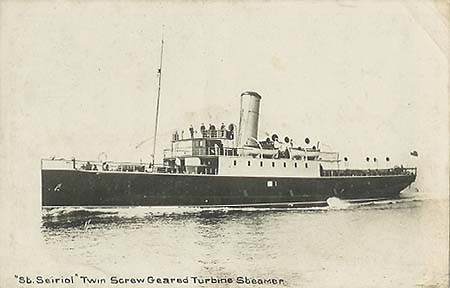
|
|
Sep 15, 1915
|
Disembarked in Boulogne,
France and the battalion proceeded to St. Omer
|
|
Nov 10, 1916
|
Awarded the Good Conduct Badge
|
|
Jan 1, 1917
|
Granted 10 days leave
|
|
Jan 13, 1917
|
Rejoined the battalion from
leave
|
|
Feb 17, 1917
|
Transferred to the 2nd
Division Signals Company
|
|
Sep 7, 1917
|
Granted 10 days leave to Nice
|
|
Sep 20, 1917
|
Rejoined the signals company
from leave
|
|
Oct 31, 1917
|
Admitted to the No. 2 CFA
(Canadian Field Ambulance) with a diagnosis that reads PUO (Pyrexia of
Unknown Origin), more commonly called Trench Fever
|
|
Nov 2, 1917
|
Transferred via the No. 26 AT
(Ambulance Train) and admitted to the No. 1 Canadian General Hospital in
Etaples and the diagnosis was changed to read Trench Fever
|
|
Nov 12, 1917
|
Invalided to England aboard
the Hospital Ship Stad Antwerpen
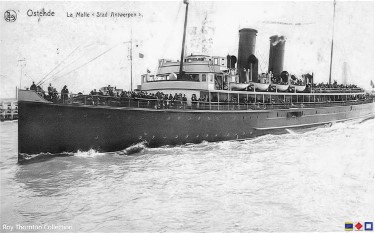
On arrival in England he was
admitted to the 2nd Western General Hospital in Manchester
Transferred to the CERD
(Canadian Engineers Regimental Depot) for pay purposes while in hospital
|
|
Nov 22, 1917
|
Transferred to the North
Reddish Hospital in Manchester
|
|
Nov 28, 1917
|
Transferred to the Canadian
Convalescent Hospital in Monks Horton
On admission he complained of
pain in right chest, feels weak and run down.
2 weeks of convalescence with Light Duties was recommended
|
|
Dec 20, 1917
|
Transferred to the Canadian
War Hospital in Walmer
|
|
Jan 18, 1918
|
Transferred to the Canadian
Convalescent Hospital in Monks Horton
|
|
Mar 2, 1918
|
Transferred to the No. 4
Canadian Hospital in Basingstoke
|
|
Mar 28, 1918
|
Transferred to the Princess
Patricia Canadian Red Cross Hospital in Bexhill where flat feet were noted
|
|
Jun 14, 1918
|
Discharged from hospital and attached
to the 3rd CCD (Canadian Command Depot) to continue his recovery
|
|
Aug 15, 1918
|
Attached to the CSME (Canadian
School of Military Engineering) for duty in Seaford
|
|
Sep 28, 1918
|
Ceased to be attached to the
school and joined the Canadian Engineers Regimental Depot
|
|
Oct 18, 1918
|
Attached to the CDD (Canadian
Discharge Depot) in Buxton pending return to Canada
|
|
Nov 19, 1918
|
Embarked the SS Scandinavian
in Liverpool
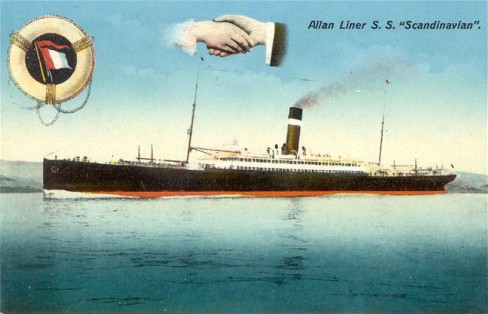
|
|
Dec 1, 1918
|
Disembarked in Saint John, New
Brunswick and proceeded to Kingston, Ontario where he was Taken On Strength
the No. 3 District Depot Casualty Company
|
|
Dec 3, 1918
|
Granted leave until December
16, 1918
|
|
Dec 19, 1918
|
Medical Board in Kingston
notes
Ø Man suffers from
DAH (Disordered Activity of the Heart) and Flat Feet
Ø Complains of being
short of breath, dizzy at times and feels all in
Ø Does not sleep well
Ø Feet are painful
|
|
Jan 3, 1919
|
Discharged from the CEF in
Kingston, Ontario
Ø Rank on discharge
Private
Ø Entitled to War
Service Badge Class “A”
Ø Proposed residence
on discharge 475 Bolivar St., Peterborough, Ontario
Following his discharge, the
1914-15 Star, British War Medal and Victory Medals were sent to him at 477
Bolivar St., Peterborough, Ontario
|
|
